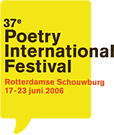Poet
|
Hugo Claus 1929-... - 2008 country: Belgium language: Dutch |
(Brugge, 1929) is, apart from an extraodinarily productive and highly regarded poet, an equally productive and regarded writer of stories, novels, filmscripts and plays, as well as a stage and film director, an artist and a translator. His extreme versatility has earned him the nickname 'the Wizard'. For the kaleidoscopic diversity of his output he has been dubbed the 'Proteus of Duch letters'. His poetic output, running to over 1300 pages, is a plethora of forms, styles, themes, even poetics. He once said in an interview: 'It's like the swing of a pendulum, a process of mutual fertilization. After a collection of difficult poems has come out, you can count on the next one being a carnival.' Hugo Claus made his début as a poet in 1947 in a rather traditonal manner, with a volume of confessional poetry, which he published on his own. In Paris in the early 1950s he came into contact with existentialism and surrealism, and with artists of the Cobra group, such as Asger Jorn and Karel Appel. In Paris he also met some of the Dutch experimentalist poets of the Vijftigers group: Gerrit Kouwenaar, Lucebert and Remco Campert. Immersed in 'the cult of the spontaneous' he produced several volumes of experimental verse, of which De Oostakkerse gedichten (Poems of Oostakker, 1955), is generally rated highest. From about 1960 Claus began to allow more of the outside world and current events to enter into his poetry, witness the outspoken social involvement in volumes such as De geverfde ruiter (The Painted Horseman, 1961) or Van horen zeggen (Hearsay, 1970). With social involvement came a growing interest in the (literary) past: references to and quotations from other poets became more frequent and overt (as in Het teken van de hamster (The sign of the Hamster, 1963), as did his use of historical and encyclopædic sources. A fine illustration of the latter is his volume about the fifteenth-century Flemish painter Hugo van der Goes, Heer Everzwijn (Mister Boar, 1970). He also 'rewrote' some of Shakespeare's and Dante's poetry (Sonnetten, 1988) and classic Sanskrit verse ('Nu nog' in Alibi, 1985). His most recent collections, De sporen (Traces, 1996) and Wreed Geluk (Cruel Happiness, 1999) display his full poetic range: next to moving autobiographical poems such as 'Broer' (Brother) and 'Oostende' (Ostend) there are complex, intertextual 'rewrites' and text montages, satirical occasional poems, doggerel rhymes and poems commenting on other poems, or on a photograph or work of art. All the themes from his earlier work - time, motion, transience, consciousness, corporality, sexuality, language and tradition, return in the latest collections. The jury awarding him the Netherlands' most prestigious poetry prize, the VSB Prize, in 1994, spoke of 'impressive, many-voiced poetry, generous, rich, unhampered by conventions of fashion or good taste'. Poets: |


